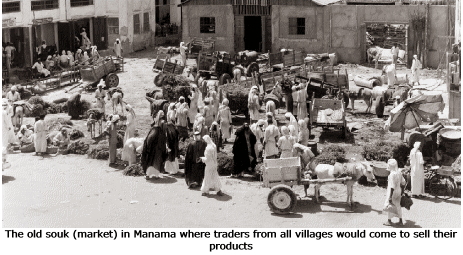|
Another man who ran round Awali was the egg man. He would run from door to door with a large tin can full of eggs and when housewives answered his ring on the doorbell they would go to the door with a bucket of cold water to test the freshness of the eggs. If the eggs sank to the bottom of the bucket they were fresh, if they floated on the top they were not.
Eggs were one of the few items of fresh food available in those days so the egg man was always very welcome. Fresh vegetables were practically non-existent so we ate mainly tinned and what meat that was available was imported frozen from the US.
 My mother and her friends were very inventive in the kitchen and their culinary talents were amazing. They shared recipes, and out of necessity, made home-baked bread, cakes and ice-cream. They also learned the art of cooking Arabic dishes, which in those days were totally unknown in the West. These foods had previously never been known to most of the expat housewives but they were all eager to learn from their Bahrain friends and each other. This knowledge they took back to their home countries where, I am sure, some of the recipes are still being used. My mother and her friends were very inventive in the kitchen and their culinary talents were amazing. They shared recipes, and out of necessity, made home-baked bread, cakes and ice-cream. They also learned the art of cooking Arabic dishes, which in those days were totally unknown in the West. These foods had previously never been known to most of the expat housewives but they were all eager to learn from their Bahrain friends and each other. This knowledge they took back to their home countries where, I am sure, some of the recipes are still being used.
Prawns were an occasionally available delicacy and as a treat we were sometimes taken down to Sitra to see the prawns all laid out to dry on the pier. We bought them direct from the Prawn fishermen for a rupee per ruttle (just over a kilo) and I can taste them even now.
When I was around 12, my family was invited to visit the home of a date farmer and it was one of the most fascinating days I can remember. After sitting with the farmer's family having cold drinks, we were taken out to the garden where we watched the farmer climb a very tall palm tree. He placed a leather harness around his back then attached it to a leather strap which went around the trunk of the tree. He balanced a basket between himself and the tree. Shinning up the tree barefoot, he cut down a huge bunch of dates which he placed in the basket before shinning down the tree again. He did that several more times and never seemed to tire. I have never since tasted dates quite as sweet as the dates I tasted on that day.
 In the Fifties, some Bahraini people still lived in Barasti villages where houses were made from date palms. Although date palm trees were fairly substantial, occasionally when a kerosene lamp fell or was blown over, it meant the whole village was burnt down. Since the oil boom, it has been many years since the people of Bahrain have had to live in such fear. In the Fifties, some Bahraini people still lived in Barasti villages where houses were made from date palms. Although date palm trees were fairly substantial, occasionally when a kerosene lamp fell or was blown over, it meant the whole village was burnt down. Since the oil boom, it has been many years since the people of Bahrain have had to live in such fear.
Thanks to the revenue from the oil and the subsequent development programmes launched by the government, Bahrain has changed dramatically to the modern, vibrant country it is today. The greatest pleasure for me, though, is that for all the changes that have taken place, Bahrain retains the old-world charm that I will always remember it for.

« Previous Page
1 | 2 | 3
RELATED LINKS:
In search of the Garden of Eden
The birth of Islam in Bahrain
Ancient architecture
Bahrain's First Family
|

